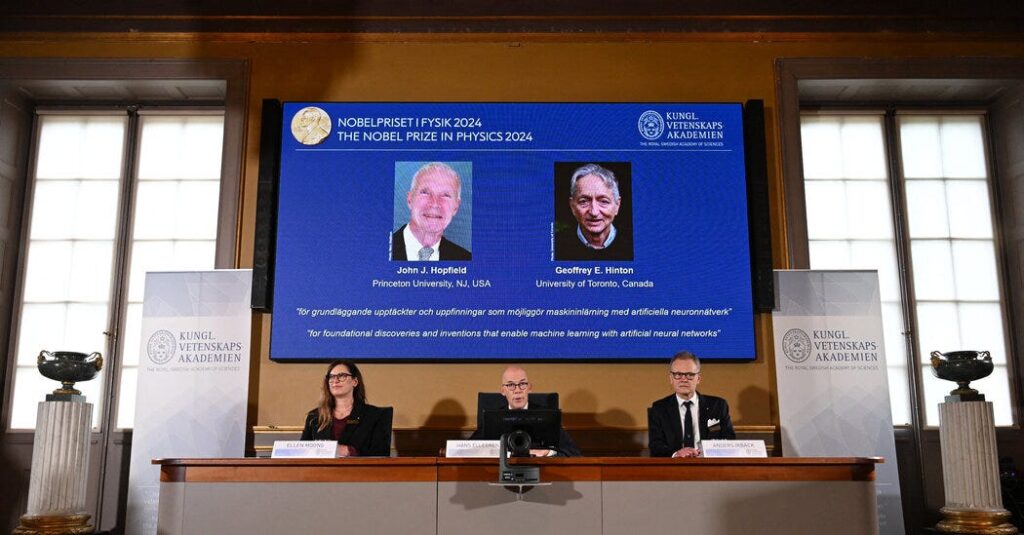Top News
AI Pioneers Awarded Nobel Prizes
Nobel Physics Prize Awarded for Pioneering A.I. Research by 2 Scientists
John J. Hopfield and Geoffrey E. Hinton have been awarded the Nobel Prize in Physics for their groundbreaking work in the development of neural networks. The Nobel committee highlighted the transformative impact of Hopfield and Hinton’s work, stating that their machine learning breakthroughs have provided a new way to use computers to address societal challenges. The committee also noted that artificial neural networks are now commonplace in internet services such as Google’s search engine, Apple’s Siri, and OpenAI’s ChatGPT, despite these services being rooted in mathematics and computer science rather than physics.
Nobel Prize in Chemistry Goes to 3 Scientists for Predicting and Creating Proteins
Additionally, the Nobel Prize in Chemistry has been awarded to three scientists, Demis Hassabis and John Jumper of Google DeepMind, and David Baker of the University of Washington, for their groundbreaking work in predicting and creating proteins using advanced technology. Hassabis and Jumper utilized AI to predict the structure of millions of proteins, while Baker employed computer software to invent a new protein. Their work, which has been described as “truly huge” by Johan Aqvist, a member of the Nobel Committee for Chemistry, has revolutionized the understanding of proteins, a task that previously took months or even decades. Now, with AI models like AlphaFold, this can be achieved in mere hours or minutes.
Adobe’s AI video model is here, and it’s already inside Premiere Pro
Adobe has launched its AI video model, Firefly, which includes several new tools for video generation and editing. The first tool, Generative Extend, available in Premiere Pro, allows users to extend footage by two seconds, making it useful for minor adjustments and corrections. Two other tools, Text-to-Video and Image-to-Video, are being launched as a limited public beta in the Firefly web app. These tools allow users to generate video from text prompts and still images, respectively, with a maximum clip length of five seconds. Despite some limitations, Adobe claims its AI video model is commercially safe and can embed Content Credentials to disclose AI usage and ownership rights when published online.
These new tools were among a host of announcements by Adobe from their Max event:
Adobe teases AI tools that build 3D scenes, animate text, and make distractions disappear
Adobe’s Project Super Sonic uses AI to generate sound effects for your videos
Adobe releases more AI magic for Creative Cloud users at Max 2024
Tesla’s big ‘We, Robot’ showcases robots, Cybercab, Robovan
At Tesla’s “We Robot” event on October 10, 2024, Elon Musk introduced futuristic vehicles, including the Cybercab, a compact two-seater electric car designed for autonomous operation, and the Robovan, capable of transporting up to 20 passengers. The Cybercab, priced under $30,000, was showcased as part of Musk’s vision for individualized mass transit, with operating costs projected between $0.20 and $0.30 per mile. During the event, 20 Cybercabs were demonstrated driving autonomously around the venue.
Another highlight of the event was the demonstration of Tesla’s humanoid robot, Optimus, which interacted with attendees, served drinks at a bar, and played simple games like “rock, paper, scissors.” While the robots impressed with their versatility, it was later revealed they were teleoperated, not fully autonomous as some had assumed. Stocks of Tesla fell by up to 8%, with many feeling that the event was more style than substance.
Tesla Optimus bots were controlled by humans during the ‘We, Robot’ event
Tesla Stock Slumps After ‘Cybercab’ Unveiling Fails To Impress Investors
Anthropic CEO goes full techno-optimist in 15,000-word paean to AI
Anthropic CEO Dario Amodei has published a lengthy essay outlining his optimistic vision for the future of AI. Amodei predicts that “powerful AI”, capable of outperforming Nobel Prize winners in fields such as biology and engineering, will emerge by 2026. He believes this AI will be able to control any software or hardware, perform most jobs currently done by humans, and even design its own tools. He also claims that AI could solve world hunger, combat climate change, and transform economies in developing countries. However, Amodei acknowledges the potential dangers of AI to civil society and the need for discussions about economic organization in a post-AI world. Critics argue that his predictions are overly optimistic and ignore the potential negative impacts of AI, such as environmental damage and increased inequality.
Dario Amodei — Machines of Loving Grace
Other News
Tools
All Gemini users can now generate images with Imagen 3 – Gemini users can now generate images with Imagen 3, which offers stunning image quality, lifelike visuals, and diverse styles, and is available to all users worldwide, incluing free accounts.
OpenAI Releases Swarm: An Experimental AI Framework for Building, Orchestrating, and Deploying Multi-Agent Systems – OpenAI’s Swarm Framework simplifies the complexities of multi-agent orchestration by providing a lightweight and controllable infrastructure based on agent interactions and task handoffs.
Zoom will let AI avatars talk to your team for you – Zoom is introducing AI avatars that can attend meetings and send messages on your behalf, using a video of yourself to create a digital twin that looks and sounds like you.
I put the new Hailuo MiniMax image-to-video model to the test — this is something special – Hailuo MiniMax’s new image-to-video model impresses with its ability to handle consistent motion, despite some minor imperfections, making it a top-tier AI model for generating high-quality videos.
Amazon’s new AI guides can help shoppers find what they need – Amazon’s new AI shopping guides use customer insights and educational content to help users quickly find products based on specific features, offering a more visual and tailored browsing experience.
Adobe Pushes Content Authenticity Forward With a Free Web App Designed for Creators – Adobe introduces a free web app, Content Authenticity, allowing creators to easily attach Content Credentials to their digital work, providing transparency and control over their content’s usage and attribution.
OpenR: An Open-Source AI Framework Enhancing Reasoning in Large Language Models – OpenR is an open-source framework designed to enhance the reasoning abilities of large language models by integrating advanced learning techniques and reinforcement learning to address their reasoning deficiencies.
OpenAI Unveils Secret Meta Prompt—And It’s Very Different From Anthropic’s Approach – OpenAI and Anthropic have different approaches to AI prompt systems, with OpenAI focusing on task efficiency and precise prompt engineering, while Anthropic prioritizes human-like AI behavior and transparency.
Business
Meta AI will launch in six more countries today, including the UK – Meta AI is expanding to several countries across Africa, Asia, and South America, adding new language support and launching on Ray-Ban Meta smart glasses in the UK and Australia.
OpenAI Chairman’s Startup Raising Funds at Over $4 Billion Value – OpenAI Chairman’s startup Sierra is raising funds at over $4 billion valuation, highlighting sustained investor interest in AI despite concerns about high startup prices.
OpenAI announces content deal with Hearst, including content from Cosmopolitan, Esquire and the San Francisco Chronicle – OpenAI partners with Hearst to integrate content from various magazines and newspapers into its AI products, following similar deals with other media outlets.
Nvidia Rides Fierce Blackwell Demand Toward Stock Record Again – Nvidia’s shares are surging due to successful resolution of investor concerns about product delays and long-term growth prospects.
Inside AI’s $1 Trillion Cash Bonfire – Generative AI has lured an enormous amount of capital. Indeed, Goldman Sachs estimates companies will spend $1 trillion to use AI chatbots in their operations. A recent example of such capital flows is OpenAI’s recent $6 billion capital raise.
OpenAI snatches up Microsoft generative AI research lead – OpenAI gains former Microsoft VP of generative AI research, Sebastien Bubeck, known for his work on small AI models, potentially boosting OpenAI’s expertise in on-device AI applications.
Research
LLMs can’t perform “genuine logical reasoning,†Apple researchers suggest – Advanced large language models (LLMs) lack genuine logical reasoning and struggle with mathematical problems when faced with minor changes, as highlighted by a study from Apple researchers.
Addition is All You Need for Energy-efficient Language Models – Efficient energy usage in language models can be achieved by approximating floating point multiplication with integer addition operations, reducing energy costs by up to 95%.
Differential Transformer – A new differential transformer model, Diff Transformer, cancels noise and promotes sparse attention patterns, outperforming the traditional Transformer in language modeling and offering advantages in practical applications.
Anchor-based Large Language Models – Anchor-based Large Language Models introduces a new approach, AnLLM, utilizing anchor-based self-attention network to compress sequence information, reducing cache and enhancing inference efficiency, demonstrating potential for real-time inference in practical applications.
MLE-bench: Evaluating Machine Learning Agents on Machine Learning Engineering – MLE-bench introduces a benchmark for evaluating AI agents’ performance in machine learning engineering, using 75 ML engineering-related competitions from Kaggle to test real-world ML engineering skills and establishing human baselines for each competition.
RATIONALYST: Pre-training Process-Supervision for Improving Reasoning – RATIONALYST introduces process-supervision for reasoning by pre-training on a vast collection of rationale annotations, improving accuracy on diverse reasoning tasks.
Presto! Distilling Steps and Layers for Accelerating Music Generation – Presto! Introduces a new approach to accelerating music generation through distillation methods, resulting in high-quality outputs with improved diversity and significantly faster processing times.
AI scans RNA ‘dark matter’ and uncovers 70,000 new viruses – AI uncovers 70,500 previously unknown viruses using metagenomics and protein-prediction tools, demonstrating the potential of AI to explore the ‘dark matter’ of the RNA virus universe.
Not All LLM Reasoners Are Created Equal – LLMs show significant reasoning gaps in grade-school math problem-solving capabilities, with smaller, specialized models exhibiting a more pronounced gap, and finetuning on GSM potentially leading to task overfitting.
LLMs Know More Than They Show: On the Intrinsic Representation of LLM Hallucinations – LLMs’ internal representations encode information about truthfulness, which can be leveraged to detect errors and predict the types of errors the model is likely to make, providing insights for enhancing error analysis and mitigation.
MatMamba: A Matryoshka State Space Model – Present MatMamba: a state space model which combines Matryoshka-style learning with Mamba2, by modifying the block to contain nested dimensions to enable joint training and adaptive inference
Concerns
I Launched the AI Safety Clock. Here’s What It Tells Us About Existential Risks – The AI Safety Clock, introduced by Michael Wade, tracks the growing sophistication and autonomy of AI technologies, warning of the potential doomsday scenarios and the need for global regulation and company responsibility to ensure safe AI development.
AI chatbots can read and write invisible text, creating an ideal covert channel – AI chatbots can read and write invisible text, creating a covert channel for attackers to conceal and exfiltrate confidential data, posing a significant security threat.
AI ‘Godfather’ Yoshua Bengio: We’re ‘creating monsters more powerful than us’ – Yoshua Bengio, a leading figure in AI, warns about the dangers of creating AI more powerful than humans, discusses the ethical concerns of big AI players, and emphasizes the need for caution and regulation in the development of AI technology.
Analysis
AI’s Big Gift to Society Is … Pithy Summaries? – AI’s ability to summarize vast amounts of information quickly and efficiently is changing the way we approach research and understanding, but there is a risk of losing depth and nuance in the process.
Source: Read MoreÂ

